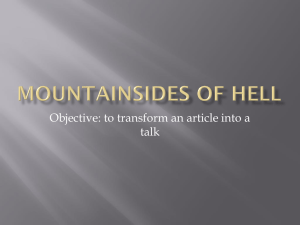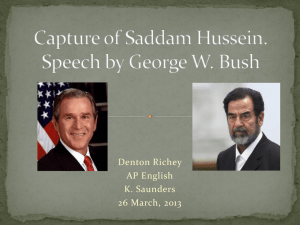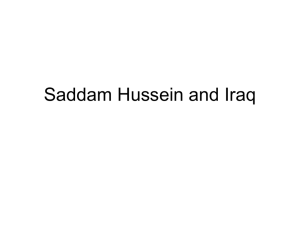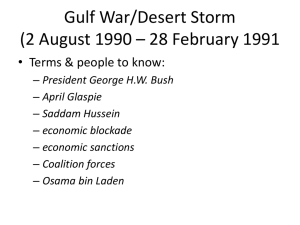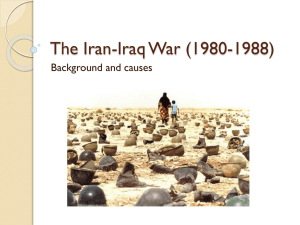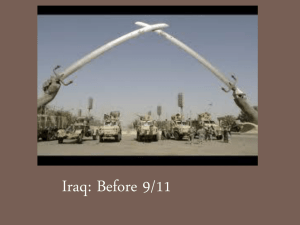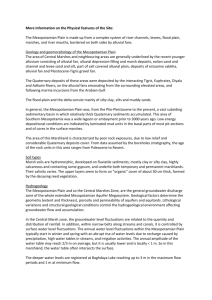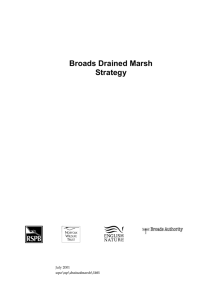Restoration of Degraded Ecosystems and The Politics of “Nature
advertisement
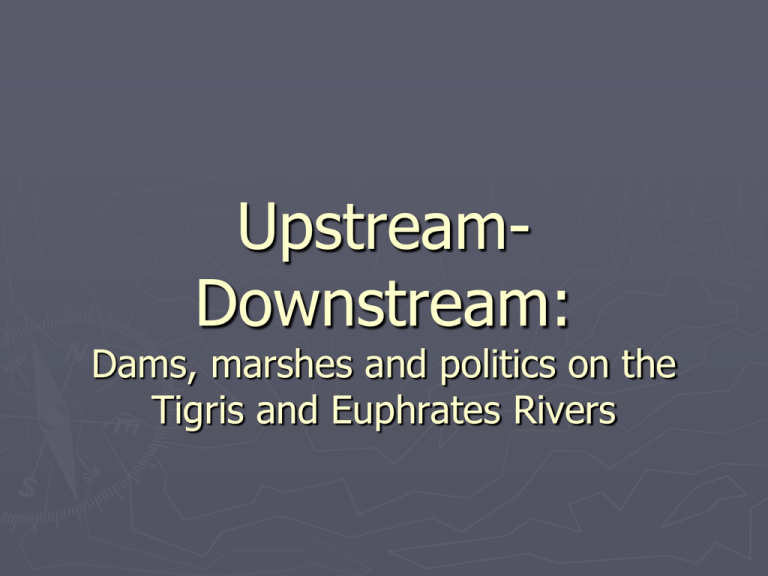
UpstreamDownstream: Dams, marshes and politics on the Tigris and Euphrates Rivers Water ► No substitutes ► Imposition of borders Watersheds are a threat to national sovereignty ► Unlike other resources, ► Upstream-Downstream it flows Power difference Temporal difference Pollution/evaporation exacerbated by extraction Infrastructure development for self-sufficiency exacerbates tension ► Dams as “weapons” Transboundary Rivers ► Regulation and management are difficult, and in many systems there is no substantive agreement over water rights or use. ► The natural geographical and management unit of water, the watershed, strains both institutional and legal capabilities often past capacity. Transboundary River Management ► Interstate watershed management is in itself largely theoretical. ► Also inherently problematic. ‘Equitable use’ is the concern of upstream states; it permits consumption and production throughout the system, not acknowledging the downstream effects of upstream use. ‘Obligation not to cause appreciable harm’ is the concern of downstream states; it implies that they should receive water of the same quality that upstream states do, which would in all likelihood place substantial constraints on upstream states’ abilities to pursue their interests. Interstate Water War Hot Spots in the Middle East Nile- Kenya, Uganda, Ethiopia, Sudan, Egypt Tigris/Euphrates- Turkey, Syria, Iraq Jordan/Litani- Lebanon, Syria, Israel, Jordan ► At the dawn of the new millennium, the tragic loss of the Mesopotamian marshlands stands out as one of the world’s greatest environmental disasters. Dams and drainage schemes have transformed one of the finest wetlands, the fabled Eden of the Fertile Crescent that has inspired humanity for millennia, into salt-encrusted desert. The ecological life-support system of a distinct indigenous people dwelling in a rare water-world of dense reed beds and teeming wildlife has collapsed. Humanity’s impact on the planet’s fragile ecosystems could not be more dramatically illustrated. This Mesopotamian story is yet another wake-up call alerting us to the fraying fabric of spaceship earth. We are again reminded that we need to act now to restore ecosystems on a global scale. ► -UNEP, 2001: viii (italics added) Marsh Literature ► Thesiger, Wilfred. 1964. The Marsh Arabs. London: Longmans, Green and Co. Ltd. ► Salim, Shakir Mustafa. 1964. Marsh Dwellers of the Euphrates Delta. London: The Athlone Press at the University of London. ► Young, Gavin. 1977. Return to the Marshes: Life with the Marsh Arabs of Iraq. London: Collins. ► Nicholson, Emma and Peter Clark, Eds. 2002. The Iraqi Marshlands. London: Politico’s Publishing. ► France, Robert. 2007. The Iraqi Marshlands: Restoration and Management. Sussex Academic Press. ► -The Marshes circa 1973-1976. UNEP, 2001. ► NASA satellite imagery of the Marshes circa 1973 (left) and 2000 (right). Deep purple signifies permanent marsh. Red signifies irrigated agriculture. Dark blue signifies permanent lakes. Light blue signifies seasonal lakes. Gray signifies barren or dry land. Local-Global ► Global actors frame ‘local’ issues. Activist groups, NGOs, engineers, economists, social scientists If the problem is X, then the solution is NOT X, provided through some function of expertise. ► No water? – Engineer builds a dam. ► No water? – Economist assigns water rights. ► No water? – Human rights group blames rights abuser. Who and where you are influences whether you see X or Y. ► Multiple partial ‘truths’ emerge ► No guarantee that local voice is ‘truth’ either The Marshes: Place, Origin, and Change ► 15,000-20,000km2 (extent fluctuated greatly) ► Garden of Eden, flood of Gilgamesh and Genesis, the birthplace of Abraham (links with "origins of civilization" are interwoven into almost every account of degradation and restoration) ► Geologically “recent” system ► Basra “narrowing”; alluvial fans descend from mountains and plateau, width of the plain is 45km ► Seawater trapped following most recent glacial recession (consistent with early written sources that Ur and Eridu were in intimate proximity to the shoreline) ► Sediment deposits pushed the coastal shore southeastward, contributing to “a slow and progressive filling up of lakes and Marshes and ultimately to their long-term disappearance” (Sanlaville, 2002: 145) ► Marshes have grown and retracted “according to the amount of control exercised over the flood water and the amount of water used for irrigation in the north” (Encyclopedia of Islam, al-Batïha) ► The future survival of the marshes must, therefore, be in question merely as a result of the changes which have occurred, or are likely to occur, in the upper parts of the basin in Turkey, Syria and Iraq… Given the political standing of Saddam Hussein in the West it is not surprising that many Western commentators have placed all the blame on Iraq for the potential disruption of the ecology of the marshes of the Shatt al-Arab. This is, however, a rather extreme view of the situation as the future of the marshes has already been threatened by the major new irrigation works in the upper part of the basin. In reality, the Iraqi actions have merely exacerbated what was already a critical situation. -Beaumont, 1998: 182 Four Dangers ► Simultaneous Marshes ► The Globalization and Localization of the Exaggerated Agency of Saddam Hussein ► Homogenization Inhabitants ► Arbitrary and Victimization of the Marsh Time and “Nature” Simultaneous Globalization and Localization of the Marshes ► “Mesopotamian Marshlands” binds a regional concern with a distant audience by creating a global or “civilizational” ownership. ► Mesopotamia, the “cradle of civilization,” is no longer a real place, but an imagined ancestral home for most cultures of the Middle East and Europe. ► Implications of “Eden” Simultaneous Globalization and Localization of the Marshes ► ► ► ► ► ► All told... recreating Iraq's marshes will be an even bigger challenge than restoring Florida's Everglades.. The key difference... is that the Everglades already has both a robust inflow of water and an agreedupon plan to fix the mess. For now, Iraq has neither. -Jacobson, The Washington Post, 04/28/03 Before Hussein's drainage project, Iraq's marshes were the Middle East's largest wetland, covering about 7,500 square miles. By the late 1990s, satellite images indicated that less than 10 percent of Iraq's marshland had any water. -Chandrasekaran, The Washington Post, 10/11/03 Few places on Earth have a stronger hold on the imagination than do the Iraq marshes... Those marshes exist mostly in... memory, however; in an unprecedented ecological and human disaster, some 90% of the famed Iraqi wetlands were destroyed by 2000. --Lawler, Science, 02/05 The Exaggerated Agency of Saddam Hussein ► In one of the greatest ecological crimes of the 20th century, Saddam Hussein managed to drain, poison, and desiccate the lush wetlands that were home to 250,000 Ma’adanis, as well as a crucial stopover for birds… Saddam launched a punitive assault in 1991 that brought desertification to one of the world’s most valuable delta regions. ► Saddam Hussein launched an attack on the wetlands and their inhabitants…the Iraqi leader’s method of revenge not only forced the mass migration of the marsh dwellers into the cities, but triggered an environmental catastrophe. ► Daniel Del Castillo, Chronicle of Higher Education, 10/03 The sheer scale of the destruction is of biblical proportions…Three wars and one insurrection played a big role, as did a concerted effort in the 1990s by Saddam Hussein to drain the marshes. ► Pat McDonnell Twair, Washington Report on Middle Eastern Affairs, 9/03 Andrew Lawler, Science, 02/05 For almost 5000 years, people in southern Iraq have been living in marshes, their livelihood depending on the waters, the buffalo and fishing. Saddam destroyed their way of life in a campaign between 1992 and 1993. Iraqi Prospect Organisation, www.iprospect.org.uk The Exaggerated Agency of Saddam Hussein ► Saddam Hussein was destined to forget the history of this cradle of civilization and did everything in his power to neglect the agricultural industry of his country. Iraqi agriculture research, improvements to infrastructure and advancements in technology were essentially nonexistent during Saddam’s tenure…Saddam also destroyed one of the world’s largest wetland ecosystems when he drained the marshlands of southern Iraq, displacing thousands of Iraqi farmers. -U.S. Representative Bob Goodlatte, “Review Iraq Agriculture”, 06/04 ► What is important to understand about this situation is that this disaster was manmade. It was the product of the corrupt, terror-ridden government of Saddam Hussein. This region, known as the “Eden of Iraq,” was destroyed…Saddam did more than evict thousands of people from their homes. He brought ecological devastation to this ancient area… Now that Saddam Hussein and his criminal regime are par of an unhappy history, attention must turn to restoring the marshlands. -U.S. Representative Ileana Ros-Lehtinen, “United States and the Iraqi Marshlands: An Environmental Response”, 02/04 The Exaggerated Agency of Saddam Hussein “In little more than a decade, the regime of Saddam Hussein nearly destroyed one of the largest and most important wetlands in the world” (USAID’s Iraqi Marshlands Restoration Program, 2004: 13). Homogenization and Victimization of the Marsh Inhabitants ► “…new opportunities and aspirations make subsistence existence completely unattractive to those with better prospects. Technology has moved on, making the old-fashioned way…painfully burdensome and unrewarding. Ochsenschlager, 2004 ► “the people of al-Naser… are now fed up. They would rather, they say, stay put and carry on farming- provided local services are improvedthen return to a rehabilitated marsh” Economist, 2003 Arbitrary Time and “Nature” ► 1973 = “pre-Husseinian”= Nature need to try to allow nature to reclaim the area…If you’ve ever been in the Marsh the way it was, you’d know that it’s a temple to God, it’s a temple to nature.” ► “You Azzam Alwash, quoted in Foreign Correspondent, 2004 The presumption that follows is that the Marshes existed in a “climax” form until the influence of the unnatural disturbance of Saddam Hussein. Table 1.1- Expected Reduction of Waters in the Tigris and Euphrates System Tigris River Annual Flow to the Shatt Al-Arab, Mm3/yr Euphrates “Natural” 49,200 “Natural” (at Hit) 32,720 Pre-Project (circa 1970) 24,300 Pre-Keban Dam (circa 1974) 16,800 2000+ 9,700 2000+ -6,441 Annual Flow in the Shatt Al-Arab, Mm3/yr - Reproduced from Kolars, 1992: 107-108 Salination ► “Irrigation has been practiced in Mesopotamia for 6,000 years and already an ancient text of 2,000 B.C. mentions that ‘the earth turned white’” (Rzoska, 1980: 6). ► “This highly dynamic ecosystem is therefore dependent on spring floods for its replenishment and very existence” (UNEP, 2001: 12). 2003-2006 ► Bush replaced Hussein ► Dykes were broken down and dried marsh flooded. ► 70% of original footprint? ► Water quality concerns. 2006-present ► Drought, climate change and Turkey ► Growing realization that solutions to the marshes will not be found in the marshes alone. ► Growing realization that marsh management will require technological solutions – dozens of water control structures to regulate water levels. What’s to learn from all this? ► Rivers flow downstream. That means problems and solutions flow downstream as well. ► Loud is not the same as right. ► “Nature” and permanence are dangerous concepts.
